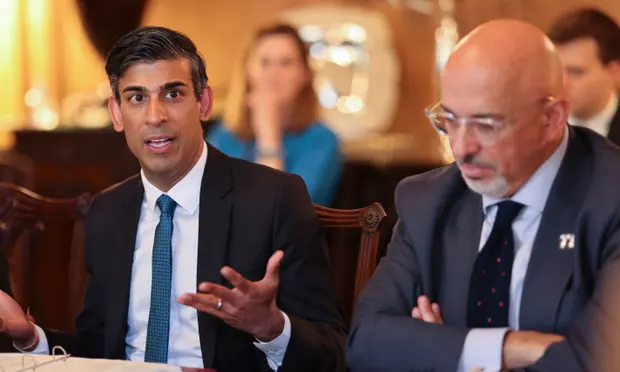The matter of who knew what about Nadhim Zahawi’s dealings with the taxman and when in Whitehall and No 10 is the subject of intense scrutiny and could yet define Rishi Sunak’s premiership.
Sunak has sought to put down suggestions he was aware that Zahawi paid a penalty to HMRC prior to his appointment as the Conservative party’s chair on 25 October 2022.
The prime minister initially told the House of Commons last week that Zahawi had already addressed the matter “in full”. But after the Guardian revealed on Friday that a penalty had been paid, the prime minister’s spokesman refused to confirm that Sunak had been told of this detail by Zahawi or officials.
Zahawi paid an estimated total of £5m, including interest, about £3.7m in tax owed and penalty of 30%, a source told the Guardian.
Sunak told MPs on Wednesday: “The issues in question occurred before I was prime minister.”
He added: “The usual appointments process was followed, no issues were raised with me when he was appointed to his current role and, since I commented on this matter last week, more information has come forward. That is why I have asked the independent adviser to look into the matter.”
Sunak’s version of events is set against more than two years of discussions of Zahawi’s financial dealings at the highest levels in Whitehall, among Sunak’s own former department, the Treasury, and his former and current cabinet colleagues.
The former prime minister, Boris Johnson, and home secretary, Priti Patel, were notified of a National Crime Agency (NCA) investigation into Zahawi as early as 2020, the Guardian understands. The investigation did not lead to any action and there is no suggestion of wrongdoing.
It is unclear if there was any relationship between the NCA investigation and the ultimate settlement arrived at with HMRC by Zahawi, which was related to shares in YouGov, a company he founded.
Sources claim that, in June 2022, senior officials at the Treasury and Sunak, then chancellor, were made aware of a freedom of information request from the Financial Times that was due to receive a response suggesting that fewer than five ministers’ tax affairs were under investigation.
In a follow-up email to the Financial Times on 23 June last year, HMRC corrected the freedom of information response, saying that there was no such investigation and that a mistake had been made in suggesting there was.
However, a subsequent phone call was made to a journalist at the Financial Times clarifying that a minister was indeed under investigation, the Guardian understands.
Other Whitehall sources confirmed that it is was ordinary practice that very high-risk freedom of information request responses are flagged to the private offices of ministers and press offices of departments. This is to allow discussion of the potential fallout for the government.
A No 10 spokesperson said: “This claim is categorically not true. The prime minister was never informed who the individual was or any details of the case, as is usual HMRC processes.” Of the claim that Sunak knew about the penalty at the time of Zahawi’s appointment, on Monday a government spokesperson also said: “This claim is categorically untrue.”
On 5 July, Zahawi was appointed chancellor amid a flurry of activity in No 10 after Sunak and the health secretary, Sajid Javid, quit in a sensational attempt to force out Johnson in the aftermath of the partygate scandal.
Despite the fraught conditions, Johnson was made aware of a tax investigation by officials, sources claim.
On 6 July, the Independent reported that Zahawi was the subject of an NCA investigation.
On 9 July, the Independent reported that Zahawi was the subject of an investigation by HMRC. The same day it was reported by the Observer that a red flag had been raised over his appointment to cabinet over his financial dealings.
A spokesperson for Zahawi said at the time: “All Mr Zahawi’s financial interests have been properly and transparently declared.”
These articles were shared among cabinet ministers and read by officials at the Cabinet Office, as well as across Westminster and Whitehall, according to a variety of sources. It is not denied that Sunak was aware of the reporting at that time.
It has been reported that Zahawi arrived at a settlement agreement with HMRC while he was chancellor, a post he was stood down from in a cabinet reshuffle on 6 September after just 63 days in the role.
Sunak was appointed prime minister in October last year after the brief but chaotic reign of Liz Truss, and Zahawi was among his first cabinet appointments.
One key question for the prime minister is whether he was told about a settlement with HMRC and that this settlement included a penalty at the time of appointing Zahawi – months before he spoke at the House of Commons on Wednesday last week.
A source told the Guardian that Downing Street was informed of the penalty and settlement with HMRC prior to Zahawi’s appointment as chair of the Conservative party. Number 10 has strongly denied that this was the case.
Source: The Guardian


